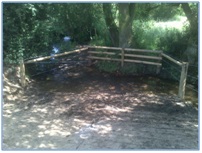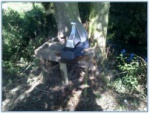Case study:Ecclesbourne Farm project
Project overview
| Status | Complete |
|---|---|
| Project web site | |
| Themes | Fisheries, Habitat and biodiversity, Land use management - agriculture, Water quality |
| Country | England |
| Main contact forename | Alison |
| Main contact surname | Baker |
| Main contact user ID | User:Jfreeborough |
| Contact organisation | Environment Agency |
| Contact organisation web site | http://https://www.gov.uk/government/organisations/environment-agency |
| Partner organisations | Derbyshire Wildlife Trust, NFU, Severn Trent Water |
| Parent multi-site project | |
| This is a parent project encompassing the following projects |
No |
Project summary
Environment Agency Officers have worked with local farmers to provide advice and deliver improvement works to address phosphate / sediment issues predominantly in the River Ecclesbourne catchment.
The Ecclesbourne Restoration Catchment Partnership developed from one of the ten Defra WFD pilots in 2011. A number of schemes were identified to tackle diffuse pollution (phosphate) issues. Severn Trent Water is addressing phosphate input from sewage treatment works and this project addresses other ‘Reasons for failure’ from agriculture.
Monitoring surveys and results
1600m of bankside fencing was installed to reduce cattle poaching. Soil management and water quality issues discussed with 46 farm businesses. Over 1000m farm tracks surfaced - to limit sediment laden run off. 2 water troughs and 1 pasture pump installed.
Lessons learnt
Support through the partnership has resulted in an HLS agreement, which includes water related options e.g. buffer strips. £10.5K match ‘in-kind’ contribution from the farmers. Developed good working relationships with NFU, Natural England and Derbyshire Wildlife Trust and has led to development of further projects.
This project has been a really positive example of partners working together to deliver common objectives.
Derbyshire Wildlife Trust is continuing to deliver biodiversity and water related benefits through their ongoing project supported by SITA funding. The existing partners will continue to develop a similar approach in the Amber catchment.
Image gallery
|
Catchment and subcatchmentSelect a catchment/subcatchment
Catchment
Subcatchment
Site
Project background
Cost for project phases
Reasons for river restoration
Measures
MonitoringHydromorphological quality elements
Biological quality elements
Physico-chemical quality elements
Any other monitoring, e.g. social, economic
Monitoring documents
Additional documents and videos
Additional links and references
Supplementary InformationEdit Supplementary Information
| ||||||||||||||||||||||||||||||||||||||||||||||||||||||||||||||||||||||||||||||||||||||||||||||||||||||||||||||||||||||||||||||||||||||||||||||||||||||||||||||||||||||||||||||||||||||||||||||||||||||||


